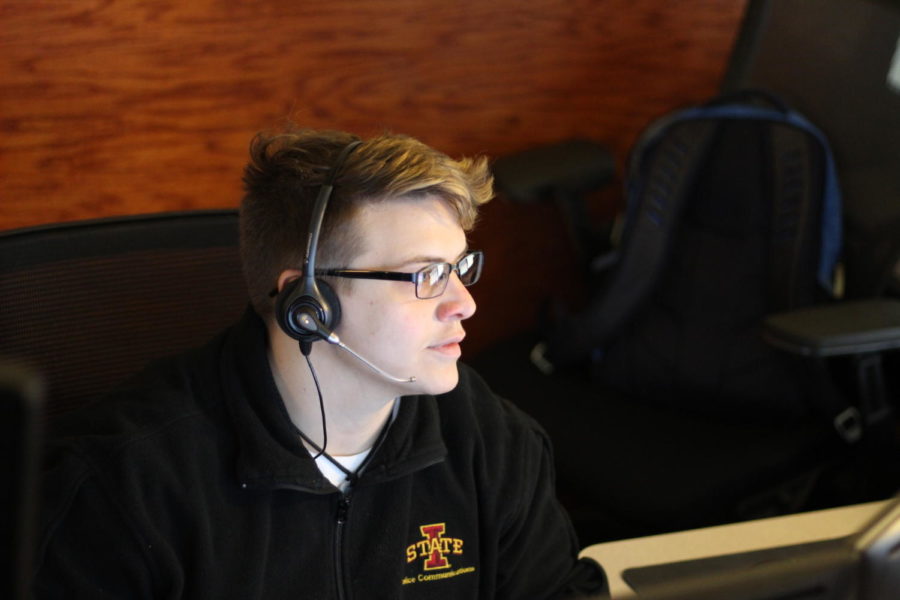Answering the call: A look at ISU Police dispatchers
Public Safety Dispatcher Tammy Barker working at the Iowa State Police Department Dispatch Office.
March 1, 2018
Editor’s note: This story is part of a partnership between the Iowa State University Department of Public Safety and the Iowa State Daily to provide perspective about the status of safety on campus and the initiatives the department worked on in 2017.
On the other end of a call to the ISU Police non-emergency number, a dispatcher is ready to answer questions and send help if needed. Many calls turn out to be less than pressing: a lost flip flop or a sock which appeared to be a pipe bomb.
Other times, and often moments after a light-hearted encounter, the dispatchers must switch gears as they receive a high-priority call.
“Each call is kind of different, and we have this understanding that when we answer the phone it’s a different call,” dispatcher Zach Girard said.
With 36,000 students to look out for on Iowa State’s campus, some pretty wild calls come in for the Iowa State Police Department.
Hope Yates, a junior in kinesiology and health who works as a dispatcher for the ISU Police, once got a call that wasn’t what it seemed.
“One night I got a call for an active burglary, and the caller was watching this guy come in and out through this window taking stuff out and putting it in his car,” Yates said.
Yates said four officers responded to the call, but when they caught the guy, it was all a misunderstanding.
“It turned out to be the resident that had decided to move out of his dorm through the window, instead of through the door,” Yates said.
Dispatcher Tammy Barker discussed another incident that was not what it seemed. Several years ago, a prop from the Live Action Role Playing (LARPing) Club caused some mass chaos unintentionally.
“The LARPING club had left a prop in a box near the library,” Barker said. “From a distance it looked like a pipe bomb. The bomb squad was sent out and it ended up being a sock.”
They also get more obscure items. Girard reported getting a singular
flip flop once.
However, these dispatchers’ jobs turn heavy as calls can go from missing flip flops to suicide reports in an instant.
When taking calls, dispatchers urge callers to stay on the line to gather information for responding officers. This led to a particularly awful call
for Girard.
“It was a domestic in progress, and we’re trying to have the caller stay on the line, and while it was in progress I had to listen to the assault go on while they screamed and waited for the police to show up,” Girard said.
Dispatcher Hillary Anderson said her worst calls are suicidal situations.
Dispatchers said they get one or two calls involving suicide every week. An officer takes extra shifts during finals to ensure that these calls are covered.
“Suicide calls are always emotional, especially when you have worried family members,” Anderson said.
Dispatcher Julie Osborn said her worst calls are welfare checks. The police will sometimes perform welfare checks when friends or family members are unable to reach loved ones.
Both Anderson and Girard said they knew the job they were getting into when they started, and both find ways to manage with the particularly rough calls.
“You’re talking to people on their worst day,” Girard said. “You have to remove yourself from it.”







